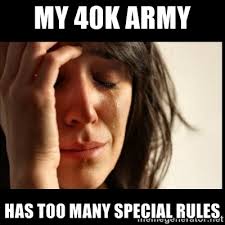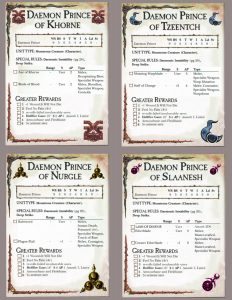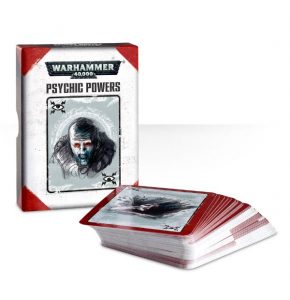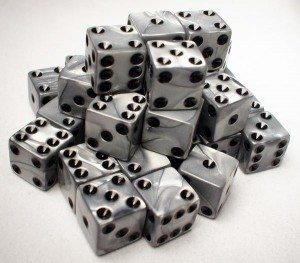The 2017 Las Vegas Open has come and gone and while it turned out to be an amazing event by all accounts, there was one issue that stood out above most; the clock.
A common complaint from the tournament, and really one that has been an issue in competitive play for a long time, was games ending due to time and not coming to a natural conclusion. This is certainly not the first time the issue has reared it’s ugly head in the tournament scene and won’t be the last. Captain A made a great post stating the case for lower point games of 40k and while he makes a lot of valid points, the ITC community has voted and the 1850 point threshold is here to stay for the time being. That being the case, I am going to present some tips which can help make the clock less of a deciding factor.
Know Your Army
When you attend a tournament there is, or should be, the social contract understanding that you and your opponent are both knowledgeable and competent in both the basic rules of Warhammer 40k, but also your armies and what they can do. You don’t need to be an expert on what every army in the game can do (although knowing these things certainly will improve your game overall), but you should be at least an expert with your own army. You should never have to refer back to your Codex during the course of a game. Time spent looking up rules or what your units can do is valuable time lost for both you and your opponent. The only time you should be referring to your Codex, or any book or dataslate, is when your opponent asks to see it in the book. With that, you should know ahead of time what things you’re going to be pulling in the game that might raise questions. Running the Masque against the nasty death star? Know exactly where to go find that unit entry in the codex. Genestealer Cults can do what on turn 1?! Know exactly where to show them the Cult Ambush table. Knowing your army inside and out will save valuable time. Minutes count in a 2 and a half hour round.
Manage Your Army Efficiently
40k Is a complex game. Many armies out there have a lot of special rules interacting with each other over the course of a game. War Convocation is a perfect example of this. There are lots of special rules the army can take and utilize throughout the course of a game. Managing those effectively can be crucial. A friend of mine runs a War Convocation army and uses a series of index cards, each with the special rules written on them. When he chooses to use his Canticles he has the card which has everything written on it for quick reference. If you have an army that has a lot of pre-game rolls, have an understanding of what you’re looking to get out of those rolls and have a way to manage them. Write them down on your army list for the game, or better yet have some method to track them quickly. An example of this can be found in this great article on the Infernal Tetrad. In the article the author points out the gifts he’s looking to get in the pre-game as well as a set of cards you can print, put in card sleeves, and mark with a dry erase for each game for ease of use. That alone probably speeds his games up by 10 minutes.
If you’re running a heavy psyker army, have an idea of what you want to get ahead of time. Have psychic power cards readily available and set them to the side. Quickly jot down on a piece of paper what powers each psyker has. Having a plan going into a game with what you’re looking to accomplish with the psychic phase will speed up your game. I often run an Eldar army utilizing a Farseer Skyrunner. I know the powers I’m looking to get off the bat. If I can get Invisibility that’s great. If I don’t roll it, I usually take Shriek then I will just take Guide and Prescience as Primaris powers. Because I know what I’m looking to do with my Farseer before the game begins. Sometimes this might change depending on the opponent, but at least have a basic understanding of what it is you want to accomplish with the psychic phase and it will speed up your pre-game rolls.
Manage Your Dice
Counting out dice every time you want to take an action might not seem like a big deal, but it can really slow you down. Seconds become minutes and those are minutes lost off the clock that you can’t get back. Anytime something will require you to pick up more than 4 or 5 dice, set aside a dice pool. Running scatbikes? Set aside a block of dice for rolling scatbike shooting attacks. Psyker heavy army? Set aside a separate pool of dice with all your mastery levels and just remove dice from the pool as psykers die in the game. Have a bunch of units with mixed weapons? Have separate colored dice to roll for those attacks in your dice pool. Managing your dice effectively will save you loads of time.
Don’t Waste Time Arguing
One of the biggest culprit for losing time in a tournament game is arguing with your opponent. Do not waste time arguing with them over a rule or how something works in the game. If you both can’t come to an understanding on how a rule should work, call a judge. Make it clear to your opponent that you are not trying to be a jerk, you just want a clear ruling on the issue. Call a judge, explain the issue, and accept the judge’s ruling regardless of the outcome. Do not argue with them on something when they make a ruling. You can always talk to them later after the game about the issue if you don’t agree, but most of the time a judge isn’t going to change a ruling he has made once it’s been made in a game. Accept it and move on.
People in competitive play often look at calling a judge over as some taboo act that should never be committed. That is absolutely not the case. Do not hesitate to call a judge over if need be, just do not abuse it. And if your opponent calls for a judge on something you’re trying to do, explain to them clearly what the issue is, why you are allowed to do the thing you’re trying to do, and the reference for it. Have it prepared for them when they ask so you can show them and they can read it over, and make a ruling.
Practice? We Talking About Practice, Man
Yes, practice. As much as you can when you can with your army. Learn to use those tools I mentioned above. The only way to get better and faster with your army is to practice the games. Most tournaments you attend will have a primer mission pack if not the missions themselves well ahead of the event. Practice those missions against the clock. Know your army’s limitations in relation to time. Practicing against various different armies will also help you understand what you need to do in a tournament if you face that army. You don’t want to spend 10 minutes in deployment trying to figure out what your opponent is trying to do to mitigate it.
Have a plan and the best way to understand what you need to do against certain armies is to practice against them. Even if you’re just playing against yourself in practice scenarios. Vassal is a great tool for this. It’s a free computer program with 40k support available which allows you to virtually simulate the table top game. Practice against armies that your list might struggle against as it will give you a better understanding of how to deploy against them, and will save valuable time in a real game as you will know what to do against them.
Practicing with your army, especially those with complex special rules like War Convocation or Genestealer Cults, will help you learn how to use them quickly and efficiently when the timer starts in a real tournament game. You’ll have a better understanding of the aspects which potentially slow you down in play with your army and how to work around them to use the army in the most time efficient manner possible.
Time is an issue in tournament play and always has been. There is nothing more gut wrenching than knowing you could have won a game if it could have played out to a natural conclusion, but you lost because you couldn’t get past turn 3. Using these tips can help improve your game and make you a faster player.
And as always, Frontline Gaming sells Games Workshop product at up to 25% off of retail, every day!
Frontline Gaming will buy your used models for cash or store credit!










Lower points limits!
People are seriously in denial about that. Yes you don’t get to use as many toys per game, but neither does the opponent and your game might actually finish.
This article was written in light of the current point limit being set at 1850. Obviously dropping points for events can speed up rounds. That said, I tried to provide advice for speeding up game play regardless of if you’re playing 1,000 points or 2,500.
For what it’s worth in the poll I voted to lower points for events.
For sure, I just felt the need to add it because it gets to a point where even the most practiced players aren’t likely to finish in time. Free points just exacerbates the issue.
I think a lot of the resistance to dropping point levels also lies in the fact that many people have bought, built, and painted armies for the 1850 standard and to lower that essentially changes the entire way they have to build their lists making them have to either buy and build more or change the list entirely and people don’t generally want to do that.
It is the elephant in the room though. Dropping points will speed up game play and certainly the easiest method for a TO to implement and manage.
I’m going to call BS on that point… Most of these guys will drop and buy entire armies at the drop of a new power codex, so dropping 200 points is nothing compared to that.
Ha fair point Leonix. But that is out of some perceived “necessity” because it’s the new hot shit that interests them as opposed to some mandatory restriction placed upon them that they don’t want to have to re-tool for, if that makes sense.
All it takes is on computer change or an faq to have that kind of affect, a points drop is no different.
Well the notion of people not wanting to buy, build, paint after re-tooling their army for a points drop requirement is not THE only reason they are resistant to it. Merely one reason.
But a FAQ change is rare simply because we get a new FAQ what maybe once or twice a year if we are lucky? Quite often these have little impact on how an army is actually designed and built. There are some exceptions such as war con and drop pods, but those are fairly uncommon.
My only point here being that sure people buy and build new armies when new codices or supplements hit because they want to not because they are obligated to do so and that is the difference. Again, not the sole reason people keep down voting a points drop, but certainly a factor.
twice lower points has been voted now, the responsibility to not play slow is on the players themselves. If you cant play fast, dont bring a slow army. With no evidence to support my next statement except my personal opinion, less people will travel to vegas for things like the LVO to play 1500 point games. Bring on the chess clocks.
Very nice article with some great tips for speeding up your play.
One thing I find slows down my games is if my opponent doesn’t have a printed copy of their army list. Having to constantly ask what unit has what wargear and what the toughness/weapon skill/strength of a particular unit is during the game, and having to wait till they look it up on their phone kills a lot of time during games.
At a lot of tournaments over here (the UK), 3 hour games seem to be common. With 1850 pts, I can generally get to at least turn 5 (plus have time to take notes and photos for my battle reports), but it is a very long day having to play three 3 hour games. I generally prefer to play 1500 points games at my weekly club, gives us plenty of time to finish the game and chat during it too.
I have heard you mention this before also. Not sure if it’s just the playing culture over there or what. Over here if you go to a tournament especially a larger one, everyone has multiple printed copies of their list. It’s usually in the requirements of the event to bring enough copies for your opponents to have them.
It’s usually a requirement over here too, but it’s one of those requirements that a lot of people seem to ignore!
I mean I’ve been to some RTTs where people just used their phones, but not larger events. I always ask players to bring printed copies for their opponents to look at in RTTs I host but it doesn’t always happen.
It does slow the game down though if someone has to pull their phone out to dig thru it to find something. It’s just common courtesy to print your lists up for your opponent really. Wish more smaller RTTs would enforce it more.
Great article! These points are critical for playing quickly. I think thaf if you do the things presented here then time will be much less of an issue. I think the key is finding ways to simplify the way your army plays.
Thanks, Horton. I agree I think the key is to streamline how your army plays. Each army has their own sort of hacks you can implement based on the army you’re playing to do this. Especially if you have an army that is going to use a lot of time in a specific phase such as Psychic or assault.
Great tips for speeding up your own play, but I think the bigger problem is going against an opponent that know’s they have a smaller chance of winning the further the game goes on. And being so they will slow down their own play to ensure a turn 3 or 4 ending.
You can play as fast as you want but if they have the right army you can’t avoid this.
Even if you bring your own chess clock and you’ve taken 30 minutes to their 120 and you call a judge over, what can the judge do? We have nothing in place to protect against this.
If a judge won’t prevent this from happening after you call him over then he shouldn’t be judging a 40k tournament. What you are talking about is deliberate slow playing. TOs need to have a policy against this set in place and a plan for it if one of their judges has to deal with a person trying to pull it in the event.
That’s easy to say the TO should do something but what’s the correct punishment?
Well, that’s the real question isn’t it? That is up to the TO to decide. But if the policy is in place up front and players know that ahead of time it will be a lot less likely to happen. For example, if a player knows he could potentially be disqualified for slow playing someone is he going to be likely to try and pull it? Probably not. There is no right answer other than, it is up to a TO to determine an appropriate consequence for such.
Deliberate slow playing is not something I’ve ever had an issue with, but it would be really annoying for sure.
Only once have I had an opponent comment on the time a game was taking, but we ended up finishing the game with 30 mins to spare!
I always hate being in the scenario where I’m currently winning if we end on 5, I know I’ll be winning at the end of 6 but if only if I get to fully play through. If we sprint through two turns then I won’t be able to use my full assault and psychic phase. So I say we have to end it on 5 even though there is enough for my opponent to get a full turn in.
How did 1850 as the standard even come about, was it just part of an ITC vote?
All of this is good but none of it will do anything about the player who thinks they can gain a competitive advantage from acting otherwise. For example incessant rules-lawyering does not happen in games where my opponent or myself are genuinely unsure about some rules interactions – I only ever encounter it where my opponent wants to constantly interrupt my thought processes or slow the game down to shorten the game. So long as these sorts of “mind games” are accepted by the competitive community they are going to happen because some players will do whatever they believe gives them an edge and which carries no realistic prospect of any penalty. Every tournament I have been to has included rules about this sort of thing in the packet, not one of them has had any mechanism to enforce those high minded statements; therefore they may as well not exist.
Would I call this deliberate slow-play? I do not think it is as simple as that – it becomes a strategy of disrupting the flow of play to disadvantage the opponent; one consequence of which is slow play.
Reducing the points would reduce the time issues with this, personally I think the underlying problem should be addressed at source. Most competitive games/sports have to deal with this stuff sooner or later and there are a number of ways of doing so.
You can only control what you do with your time in a tournament. If someone wants to rules lawyer don’t argue with them. State your case. If they don’t agree call a judge. It really is as simple as that.
If someone is slow-playing you deliberately, again call a judge. If they won’t really do anything about it well then you know that’s probably not an event you’d like to entertain attending again. Most judges will act accordingly if someone is slow playing you. Be it put both of you on timed turns or something similar. If you’re moving fast, timed turns won’t bother you much as you’re not the one slow playing for an advantage.
It is the dirty little secret of a lot of armies though. Many of them know how to win by turn 3 or 4 with their armies and will attempt to manipulate the clock to do that. If you see this happening then all you can do is call a judge on it if talking with them won’t help matters.
The frustrating part for me as a horde player is definitely time because guess what, it’s too my advantage the game go till completion!
Yet people still will complain about malicious slow playing. Trust me, I’m a competitive dude, I’m playing as fast as I can. As someone with hordes of assault units, I want my opponent to not know if the game is going to end and have to keep contesting objectives with units I can immediately murder.
With that being said, I don’t think I’ve every encountered deliberate slow play either or at least not in any way which I could detect.
I think the “deliberate slow player” is a rarity in a competitive event. Most people aren’t going to play this way. Does it happen? Yes sometimes but people act like this is the norm. It is not. Most people want to get through a full game.
Sadly I have hit this in 2 of my last 4 tournaments, get to the top table and meet a player who is clearly well practiced at this. I do not really see what the TO can do if they have not put a clear system in place because the player is ready and willing to deal with their informal efforts to resolve which are really grounded in a false assumption of good-will.
If the judge tries to put timed turns in place the player will just issue unlimited amounts of frankly silly rules/measurement/whatever challenges during my turn to put me under undue time pressure.
Maybe i am just unlucky on the players I meet but until I see tournaments which have thought through the issue and have a system in place I doubt if I will bother attending any more. Having watched a couple of the LVO streams last year I do not think it is just me: I can clearly recall a player making frankly ridiculous rules challenges for the judge and those can only have been to either upset their opponent or to use up the time on the clock (or both). Even at the top tables at the LVO there was little or nothing the judge could do although those are pretty experienced judges.
@chandler Great article and the tips will definitely help players speed up their game, but it still doesn’t protect you from your opponent exploiting the time rules. You say get a judge but that never works. They are often spread very thin and most often they are unwilling or unable to do anything about time exploiting. The only real way to have fair games that end naturally, at any point level, is to use Chess clocks.
To be honest, I don’t think chess clocks are the answer. 40k has too many interactive phases which makes clocks not totally accurate. What prevents a slow player from counting out his dice every time he needs to roll his armor saves?
The only way to resolve this timing issue is to remove bloat from the game system and that means waiting for 8th edition to see what they do with it.
There are tons of things that can improve.. many dice are rolled for randomness.. reducing that and making positioning more appropriate can fix some of that. Reducing unnecessary rules, and consolidating where rules are found.
I’m not convinced chess clocks really fix anything either to be honest. I think they’d be handy to have but worth the $30+ for each? I don’t think so.
Yeah I’ve had multiple games where the slow downs came in my turn but not as a result of anything I did to slow it down.
“Unit A shoots your Unit X with this many dice, wound on 3s, and that’s 6 armor saves for Unit X”
“Wait it’s coming from where…?”
That sorta thing happens all the time and it’s something a chess clock won’t sort out. In principle, it provides a nice baseline but if you use them it has to be in conjunction with something else.
These are both common misconception about clocks and I don’t know where they came from. I think people must not be using them right.
@Grizzyzz “To be honest, I don’t think chess clocks are the answer. 40k has too many interactive phases which makes clocks not totally accurate. What prevents a slow player from counting out his dice every time he needs to roll his armor saves?”
So it is not possible for your opponent to cheat you out of time because you control it. You have the right but not the obligation to pass the clock anytime its not your action. What this means is that if your opponent has a bunch of saves to make you pass the clock to them and they do it on their own time. It works extremely well.
There is a very good post on dakka that lays out the foundation for using chess clocks in competitive 40k tournaments.
https://www.dakkadakka.com/dakkaforum/posts/list/679969.page
“I’m not convinced chess clocks really fix anything either to be honest. I think they’d be handy to have but worth the $30+ for each? I don’t think so.”
This isn’t accurate, you can get a great clock for well under $30 the one i suggest the DGT 1001 is $20 all day on amazon and i got mine for $15 on sale.
Clocks are cheap transparent, fair and extremely effective in combating time exploiting and generally make tournaments better in every way.
There are multiple free chess clock apps for smartphones also. Cost isn’t the issue.
The issue with chess clocks IMO is that your opponent can ‘rob’ you of time by passing the clock to you constantly on his turn. In every phase of the game there are things that you may have to do in your opponent’s turn – interceptor, denying spells, overwatch, combat attacks, and saves in all those phases.
You have multiple opportunities to run down your opponent’s clock just by shooting at them. Pass the clock every time saves need to be made – particularly for units that will be doing Look Out Sir, re-rolls, and/or FNP.
It works in Warmachine because its very likely your entire army doesn’t have anything it can do in your opponent’s turn. It works in Chess because theres nothing to do.
But IMO it doesn’t work in 40k because there are so many ways you can be running down your clock through actions your opponent takes.
Each army plays differently, so clocks won’t work. All you will do is hurt high model/dice count armies.
If you’re running 120 models and I’m running 6 you shouldn’t be entitled to anymore time per turn than I am.
It’s your responsibility to play that army faster, not my responsibility to allow any opponent with a large army to have more time per turn.
totally agree.
Amen.
Rob, great concise article here buddy. Very good advice and very clear suggestions.
Thanks, brother! Unfortunately none of them will ever guarantee a game finishes naturally in a tournament, but any method to save time during play can help facilitate it.
Good advice, but there’s only so much you can do before lowering the points cost just becomes a necessity. Like trying to find the most efficient way to get to work, you can learn all kinds of methods to shave off a few minutes from your daily commute, but ultimately, if you live far away it takes longer than if you just lived close by. Well, you can learn all kinds of tips to speed up your game, but an 1850 game is going to take longer than a 1500 point game. All the tips you’ve described help you just as much, if not more, when your points limits are lower.
The advice I presented was intended to be advice to help speed play up in general really. Whether you are playing 1000 or 2000 points. The issue of a points drop is really an entirely different subject. It will speed games up definitely and lead to more people finishing on time in tournaments.